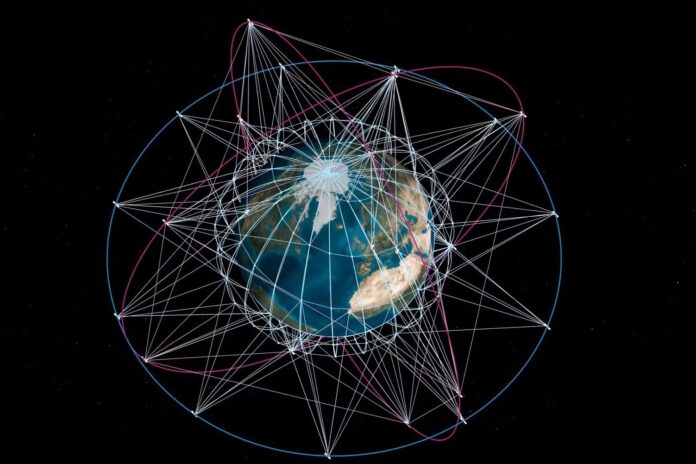The home-grown SpaceRISE consortium will deliver Europe’s much delayed LEO/MEO constellation but it may cost €10 billion
A consortium of European satellite operators comprising SES , Eutelsat and Hispasat – calling themselves SpaceRISE – has been awarded the contract to develop, deploy and operate the EU’s secure connectivity satellite system: IRIS². The multi-orbit sovereign broadband constellation – which stands for Infrastructure for Resilience, Interconnectivity and Security by Satellite – will comprise over 290 satellites on various orbits and the associated ground segment to provide governmental services by 2030 while enabling commercial services.
The three consortium members will rely on a core team of European subcontractors from all segments of the satcom ecosystem for the delivery of the scope of the concession contract: Thales Alenia Space, OHB, Airbus Defence and Space, Telespazio, Deutsche Telekom, Orange, Hisdesat and Thales SIX.
The procurement is now entering its final phase towards the signature of the concession agreement scheduled by December 2024, upon which the legal and financial commitment from both parties will be taken. Full operational status is targeted for the early 2030s
The 12-year concession contract will be funded by public (European Union and ESA) and private investments (the SpaceRISE consortium). Regarding the European Union’s contribution, as the duration of the concession contract spans across multiple financial perspectives, the European Commission will first proceed with a budgetary commitment for the current multiannual financial framework. Additional amounts may be awarded after 31 December 2027, subject inter alia to the adoption of a successor programme by the European Parliament and Council, and the availability of the corresponding appropriations.
However, Spacenews has reported that while Europe had also initially agreed to fund 60% of a €6 billion budget for IRIS², the remaining cost would be covered by the private industry. And that cost is rising with press reports now suggesting it has reached a more realistic €10 billion. Global services, which would also include capacity for the commercial market, were previously scheduled to begin by 2027, with satellite deployments planned for 2025. The European Space Agency will also contribute.
SpaceRISE offer includes appropriate measures to ensure competitive subcontracting in the selection of its supply chain, in particular for SMEs, and stimulate innovation by promoting new entrants’ participation. In its initial request, Europe aimed to require that at least 30% of IRIS² contracts over 10 million euros be subcontracted to smaller businesses to promote a more robust and diverse space economy across the region.
The CEOs respond
“The IRIS² programme is a powerful extension of Eutelsat’s commitment to advancing Europe’s digital sovereignty through sustained investment in multi-orbit technology to deliver multi-layered, low-latency networks, which are essential to Europe’s strategic resilience,” said Eutelsat CEO Eva Berneke. “We are proud to support the EU on this project alongside the consortium partners to deliver a resilient, future-ready communication system that meets Europe’s most critical connectivity needs, while generating value-creation for Eutelsat and its stakeholders by complementing and enhancing our existing LEO capabilities.”
“We are firmly committed to everything that IRIS² represents: a sovereign secure communications system, supported by European innovative developments and driven by public-private partnership,” said Hispasat CEO Miguel Ángel Panduro. “It is an ambitious project, in which the companies of the SpaceRISE consortium are working to offer the best response to the demands of the European Union. This award is an exciting first step of a project that will define the future of satellite communications in Europe.”
“SpaceRISE, based on the European Union’s requirements will define and develop a future-proof space network that will serve as the cornerstone of Europe’s space and defence strategies in the years to come,” said SES CEO Adel Al-Saleh. “The IRIS² system is aligned with SES’s multi-orbit network and underscores our commitment to advancing our MEO capabilities, as well as having access to LEO orbit. We will continue to ensure that the contract meets our IRR requirements, cash generation fundamentals, and investment grade metrics.”
(Image source: SES)


